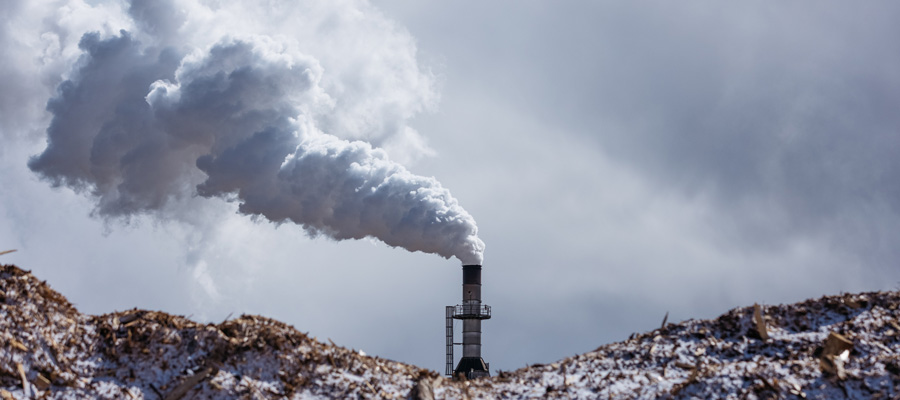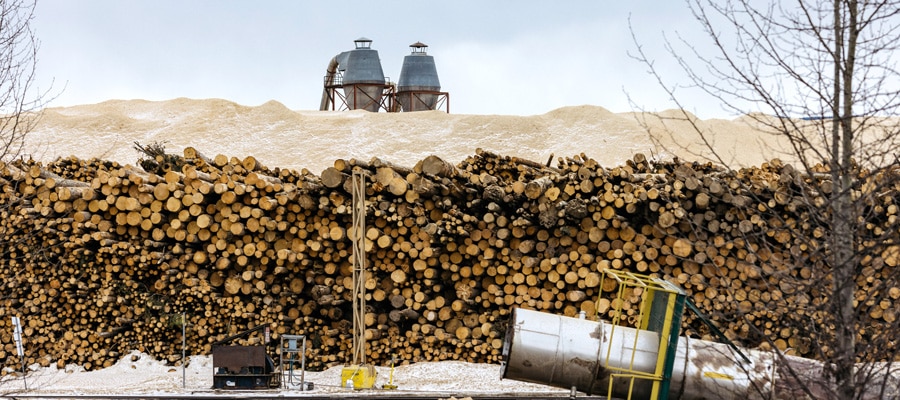The Revolving Door: Troubling questions raised as BC’s chief forester prepares to work for global wood pellet giant, Drax

At mid-afternoon on Monday (April 4), senior staff at British Columbia’s Ministry of Forests were told that one of their highest-ranking members—the province’s chief forester, Diane Nicholls—was entering the revolving door that would sweep her seamlessly out of government employ and into the industry her ministry regulates.
“Diane is leaving us to further her work in sustainable forestry in the private sector in the role of VP Sustainability for North America with Drax,” Rick Manwaring, the ministry’s deputy minister, said in an email to 30 of his colleagues, adding that Drax “is a United Kingdom-based energy, carbon capture and pellet company and is establishing its presence in both the US and Canada.”
Whether Manwaring himself chose those words or was assisted in drafting them by government communications staff is unknown.
But what can be said is that his email either deliberately or unintentionally downplayed what Drax is or what its “presence” means for BC’s forests—which are overwhelmingly publicly owned, yet have become corporate fiefdoms under the leadership of one provincial chief forester after another and the political leaders they report to.
Here’s three things Manwaring didn’t say about Drax:
- Drax operates the world’s largest wood-fired thermal electricity plant, a UK-based operation that consumes an astronomical 10 million tonnes of wood pellets a year. Since the UK’s forests are entirely incapable of producing enough wood to satisfy the plant’s needs, Drax must get all its critical raw material from elsewhere.
- Almost one year ago, Drax established a near-monopoly in BC when it bought up the assets of Pinnacle Renewable Energy, thereby gaining full or partial control of half the province’s wood pellet mills. In just its first year of gaining that dominant position, its share of wood pellets exported from BC skyrocketed.
- Drax claims that the wood pellets it burns come from “residual” sources, in particular the massive amounts of wood chips created at lumber mills when round logs are converted to rectangular lumber products. But in truth, massive numbers of whole trees are being ground directly into wood pellets at BC pellet mills owned by Drax, accelerating deforestation in a province running short of trees to cut down. Worse, wood pellet making generates very few direct jobs while making a product that is then burned at significant cost to our already seriously stressed climate. And here’s something Manwaring didn’t say about Nicholls. Two years ago she chose to be in an industry-funded video extolling the virtues of wood pellets.
The video was produced by the Wood Pellet Association of Canada. In it, Nicholls makes the same claims promoted by her future employer—that wood pellets are part of the “circular” forest industry where wood waste from one operation becomes the critical feedstock for another.
“When you look at pellet production in British Columbia, it’s part of building that circular economy in the forest sector. It uses residuals from sawmill production that may not be used otherwise and it also is starting to use harvest residuals that we know is not being used currently. And that is a win, because it’s something that is an added value for the benefits of British Columbians.”
Video footage and photographs from three pellet mills show huge numbers of whole logs piled up.
But what Nicholls says next is most telling:
“What I see the pellet producers doing is opening our minds in BC by utilizing parts of the tree that currently aren’t necessarily used always. And being able to find a manufacturing potential for that fibre and find a market for that manufactured product as in pellets and be able to add value to the economy of British Columbia, without impacting how much we harvest in any way, shape or form.”
Clearly, however, this is not the case. Video footage and photographs from three pellet mills show huge numbers of whole logs piled up at facilities in Burns Lake, Smithers and Houston—facilities all once owned by Pinnacle and now by Drax.
Moreover, as chief forester in 2017, Nicholls noted that in the Prince George area of BC alone, logging companies delivered an estimated 2.4 million cubic metres of logs to wood pellet mills and pulp and paper mills over the preceding five years. Many of those logs were then turned directly into wood pellets rather than the pellet industry doing as it says it does—utilizing “waste” or “residual” wood from the sawmill industry.
When Len Vanderstar, a retired professional forester and professional biologist who worked in various positions with the provincial government, saw the Nicholls video he said he and other former government employees were uncomfortable.
“Myself and some others questioned the perception of a conflict of interest,” Vanderstar said when contacted by phone following Manwaring’s announcement.
Michelle Connolly, director of Conservation North, a Prince George-based group that seeks to protect the interior region’s remaining primary forests (those forests not yet subject to industrial logging) said she was concerned by Nicholls’ pending move from government to one of the world’s top wood pellet users. She is particularly concerned given evidence that tracts of primary forest in the region have been purpose-logged to make pellets.
Nicholls’ pending move from government to industry comes at a pivotal moment.
“Do movements like this facilitate the regulatory capture we see in BC, where policies and programs made by government are ultimately authored by the industry?” she asks.
Regulatory capture refers to situations where a government regulator tasked with promoting the public interest instead promotes the interests of the very industry it is meant to oversee. A common feature of captured regulators is the revolving door that Nicholls has entered. It’s a portal that many of her predecessors in other provincial entities such as the Oil and Gas Commission have already passed through and many more likely will. And it raises questions about whose interests are really being served as publicly owned resources are effectively managed out of existence.
Nicholls’ pending move from government to industry comes at a pivotal moment. A fight over the last of what remains of the province’s old-growth forests is underway, following a government announcement last year to “defer” logging in a portion of those old-growth or primary forests that remain.
At the same time, the pellet industry needs access to a whole lot more such forests if its operations are to be propped up. In letting his colleagues know about Nicholl’s pending departure, Manwaring said that Nicholls was leaving the ministry in good shape to continue its work of “caring” for BC’s forests.
Based on recent experience, it looks like care will equate to a whole lot more trees becoming pellets to be burned.
Topics: Environment, resources & sustainability, Transparency & accountability

